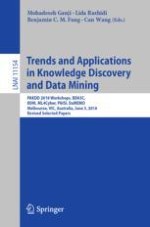2018 | OriginalPaper | Buchkapitel
Dynamic Whitelisting Using Locality Sensitive Hashing
verfasst von : Jayson Pryde, Nestle Angeles, Sheryl Kareen Carinan
Erschienen in: Trends and Applications in Knowledge Discovery and Data Mining
Aktivieren Sie unsere intelligente Suche, um passende Fachinhalte oder Patente zu finden.
Wählen Sie Textabschnitte aus um mit Künstlicher Intelligenz passenden Patente zu finden. powered by
Markieren Sie Textabschnitte, um KI-gestützt weitere passende Inhalte zu finden. powered by
